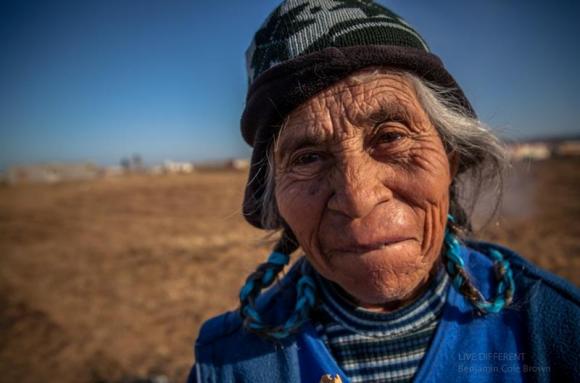Always Be Thankful!
Perfection is hard to describe but I guess it’s in the eye of the beholder. However I think I can speak for everyone when I say that our build week was nothing short of perfection.
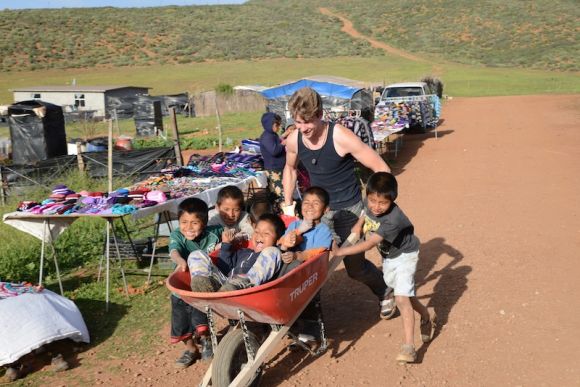

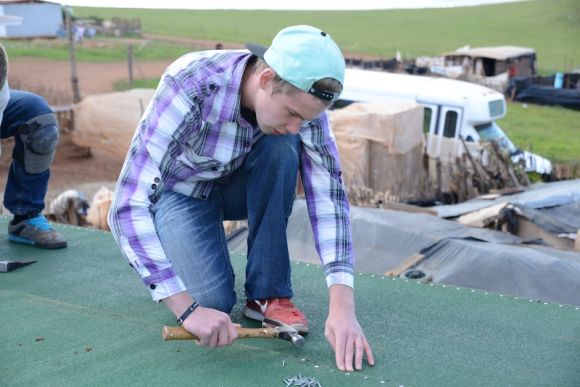

Perfection is hard to describe but I guess it’s in the eye of the beholder. However I think I can speak for everyone when I say that our build week was nothing short of perfection.




For most, I would guess, the week has gone by too fast. For the people of the hills, given the cold weather, this winter week may have gone by too slowly. It’s all relative . Poverty exists where reality falls below expectations. A person may not be poor if they believe that life is providing them with all that they truly need. One person’s necessity may represent another’s unnecessary luxury. It’s all relative.
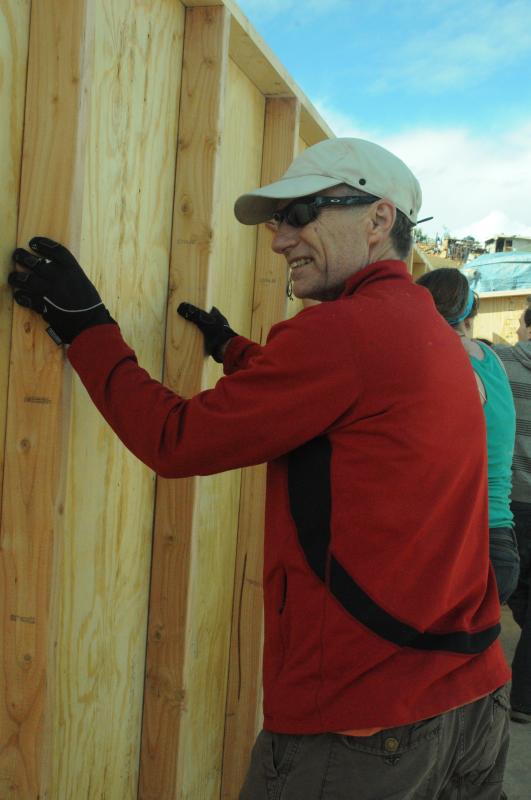
Today, three (more) Mexican families gained a gift that, for them, probably represents something closer to a necessity than a luxury — a new house. They all had a structure which they had previously called a house, but which usually lacked a decent door and/or roof. It’s all relative.
These three families expressed their respective gratitude in very similar ways. First, the father spoke, and then the mother brought tears to the eyes of the builders, and usually her older children, by shedding her own. Other neighborhood children ran around the group, some speaking their limited English vocabulary. Some people were realizing a dream and others were still chasing one. It’s all relative.
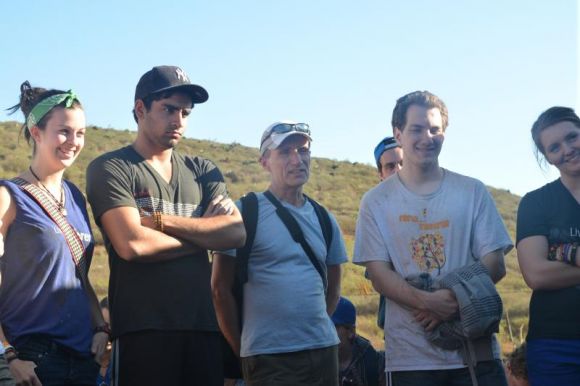
Three families in those hills now have one less worry. They still live in a neighborhood that has no constructed roads, no sewage system, and very limited access to electricity in the year 2013 in a country with the world’s thirteenth largest economy. Perhaps, richer countries care for their underprivileged citizens less well, but other poorer countries have created much better social safety nets. It’s all relative.
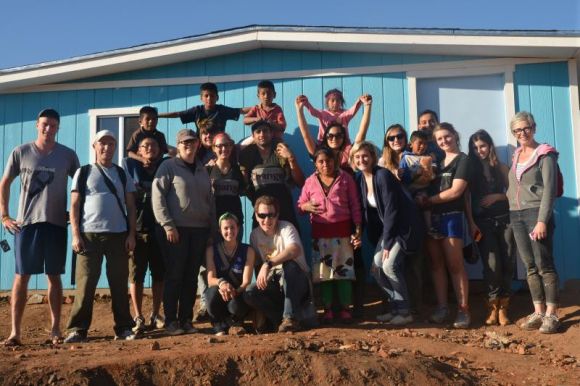
La familia es más importante. It’s all relative
Murray – LiveDifferent Volunteer, Mexico, Christmas 2012
Whatsup! My name is Josh. This is my first hero holiday and below is a little about my trip to Mexico.

The first thing that really struck me on the trip was the similarity between us, those who have come to build from Canada, and the local people. I’m building for Paula, Silverio, Estefania, Karina, and Israela but there are always a lot of locals around the site helping us out and watching us work. I expected a rough divide between us, however I’ve come to realize that every similarity, no matter its positive or negative implications, serves as an indication of the importance of the humanitarian efforts to bring human dignity and equality.

On Sunday we assembled the house with the help of local grandmas, men, children, and mothers. We raised the four walls under the careful direction of our fore-woman Kelly. As we began to paint the house we noticed a thick, dark rain cloud advancing towards us. Soon the rain started, showering everyone in these big cold droplets, and we scrambled to put our tools in the back of the bus. It wasn’t until we were pulling away on the bus that we noticed our fresh paint streaming off the house and a group of locals caught out in the cold. We could leave the site in the comfort of our bus, but they were still on the muddy hill where we were building our house, lacking strong roofs or warmth. Still they smiled, showing resilience familiar to those who struggle to meet their basic needs. On the bus trip back, there was mostly silence and the low murmurs of those voicing their discomfort with leaving the site and abandoning those who we had come to help. It was just too easy for us to drive away. What would happen when we left Mexico altogether? How can we live in comfort when others around us have so little? It’s always easy to oversimplify these situations and live detached in an illusion of helplessness.

On Monday, I was fortunate enough to have a long talk with one of our translators. He outlined the workings of the Mexican drug cartels and their relationship with America. The cartels, he explained, smuggle the drugs into the States, fulfilling the demand in the North. Doing runs for the cartels pays unfathomably better than working in the fields picking fruit or vegetables; when it comes to the point where a family is struggling to feed their small children, there is often no other option. Our translator explained that the media has severely distorted the violence that occurs in the country. Legal efforts against the cartels have often led to a power vacuum that brings violence. However in general, the cartels’ presence is minimal. The money that the drug cartels bring in can often be used positively in the community. However as a whole, the Mexican drug trade is part of Mexico’s role as a satellite economy that is dependent upon the consumerist culture of Canada and the States. It’s doubtful that drug cartels in Mexico will dissipate before the Northern demand ceases. In short, we should be critical of our escapist culture, which is fixated on luxuries and mind-altering substances, instead of turning our anger towards Mexico.
It’s hard to put the sentiments associated with this experience into words. It’s frustrating to try to put something so big into words. I hope what I’ve written gives some sense of this trip and what the volunteers are doing.
Josh – LiveDifferent Volunteer, Mexico, Christmas 2012
Hello my name is Brandi. I’m 17 years old and visiting Mexico from the small town of Edam, Saskatchewan. I came to Mexico thinking I would simply meet new people, observe another culture, and lend a helping hand. There couldn’t be a bigger understatement. When packing for Mexico I was anxious for the experiences I would be encountering. Mexico was a place I had gone for nice warm trips with my family. I had been to resorts, the beach, and toured vendors. I remember visiting this country in the past and hearing about what was going on outside of the tourism area and not understanding. Also, as my Mom was preparing me for this trip it was a preparation for a dangerous place where I wasn’t to trust anyone. That was a huge mistake. I have never felt so safe in my entire life. The more that I see this country, the more understand about the Mexican culture and poverty in general, the more I don’t understand about humanity.
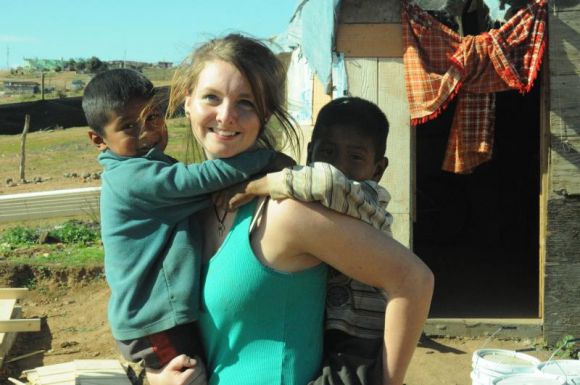
Earlier in the fall we were sent profiles on the families that we would be building for. There were some heart wrenching living conditions that were tough to comprehend. Of course it was easy to continue to work and live in my own little world, retire to my heated house, and crawl into my own comfortable bed every night. On Monday we went to meet these strangers that we had read about months prior. These people were no longer blank faces on a computers screen, they were now physically in front of us. Their story was no longer words in an email but something we couldn’t get away from. Poverty is real, and these people live completely different lives from us all simply because of the birth lottery.
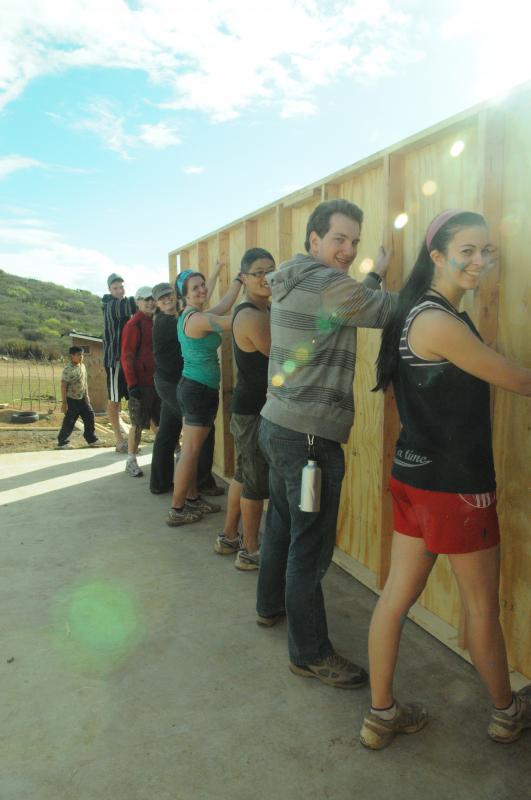
It didn’t take long for these people to become our friends. Although we didn’t share the same language, we could communicate in different ways: hand gestures, broken Spanish, and smiles. The children stole our hearts in a fundamental way, showing us just how much love one can have in the direst of circumstances. And the fun they have! Without helmets or protection of any kind, four kids raced down a steep hill riding Tonka trucks and tricked out milk carts as we cheered them on! Everything was a game to these children; we had kids lining up for a chance to hammer a nail or paint the walls of the house, excited to simply be part of the build. Their happy grins and loving smiles were some of the best things that I’ve ever been lucky enough to experience.

Not everything is fun and games, however. On our second build day, we were struck by a sudden rainstorm, an experience very different from the Canadian weather that we are used to. These storms can devastate the communities in which we work, as many houses are built from little more than cardboard and plastic and provide minimal protection from the elements. Though we had been informed that the rain was coming, it was still a challenge to put down our tools and retreat to our bus, while so many others shivered outside. It was a relief to finally put the roof up on the house, so that our family (and their neighbours and friends) would no longer be exposed to Mexico’s inclement winter weather.
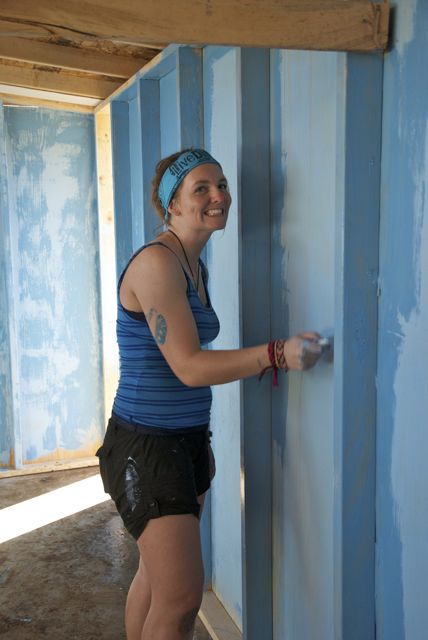
My time in Mexico this Christmas and New Year’s was among the best experiences in my life; the people that I’ve grown to know and love will be with me forever. I can’t fully express how amazing this trip is in this blog; to understand the joy in the smile of a child in poverty, you must see it for yourself.
Brandi – LiveDifferent Volunteer, Mexico, Christmas 2012
We packed our bags and set off on our journey to San Felipe. We stayed in San Felipe for a week and during our time there we had the opportunity to do various volunteer jobs and work with many inspiring people. There was one day in particular that touched our hearts, all in different ways. We went to an orphanage, Casa De Fe- which means Home of Faith. There are 9 little girls who live in this house, ages 2-11, all with touching stories of how they got there. From the moment we walked through the gate the kids were taking our hands and welcoming us. They played with us, sang to us, and enjoyed wearing our sunglasses and taking pictures of themselves with our cameras. They were like any other little girls in the world, with their hair in little braids and wearing immense amounts of pink. They were in a place where they were happy; it was kind of like their own little piece of heaven, a place where they could be kids and do what kids do. Each little girl living at Casa De Fe had a smile that could brighten anyone’s day and a laugh that sounded like the most magical music in the world. There was nothing else we could have imagined doing on that sunny day, it was the perfect way to spend it. After hanging out some laundry and doing some yard work we spent our day playing soccer, swinging on the swings, and helping the little ones go down the slide. It felt like we were kids again ourselves.

Casa De Fe truly felt like a home, and all these little girls were sisters at heart. It was such a happy place to be and even though it is an orphanage, it’s a home for them and a place of serenity and security, something they never had before. Despite the past violence, abuse and neglect these little girls have gone through all their lives, they were happy and smiling; they soon became the toughest, bravest, little people I knew. It made me sad to think that no one wanted these precious children and their parents didn’t bother to try as hard as they could to be able to be there for them. Parents, the people who should be there for you through the thick and thin and always be the two people who will never let you down, but these little girls were let down by theirs. They will never have the relationship they should have with their biological parents and some may never even get the opportunity to meet them.

One adorable little girl had a story so heartbreaking it was hard not to tear up when I heard it. This little two year old girl came to Casa De Fe when she was just one year old. Her parents did not treat her how a little baby should be treated; she did not receive the nurturing, love, and safety that a child should receive from their parents. Instead of tending to the sound of their daughters cry, they would hit her until the sound disappeared. As a result, this innocent little girl’s body was left bruised and her baby teeth were all chipped from her gums- all because her parents did not want to hear her cry, or pick her up and hug her, to show her love and care for her. They left her in her crib, hurting, on the inside and out. No child so young and frail should have to endure the pain that this little girl did. Casa De Fe saved her, in so many ways, without it who knows where she would be today. Yet, after going through all that she did, this little girl had the most beautiful smile and the most magical laugh because now, she is loved and now, she has a home.

When it came time to leave I really didn’t want to go. All of these little girls taught us so much and showed us what it’s like to really be a family and love each other. Casa De Fe is a place I will never forget and an experience that I will hold dear to my heart. I won’t ever forget the smiles of those little girls, the toughest, bravest, little girls in the world.
Chey – LiveDifferent Academy Student 2012
On an ideal Saturday in Mexico, like today was, most people would probably want to be spending time on the beach getting tan, or even just lounging around. While these things sound pretty great, it’s not how we chose to spend our day. Instead, we spent three and a half hours in a dusty cemetery painting rocks white…doesn’t sound like a great time eh? But we couldn’t have been happier to spend that time making someone’s loved one’s grave as beautiful as we could manage with the small team of 8 ½ people (the half being little two year old Edwin) that we had assembled.
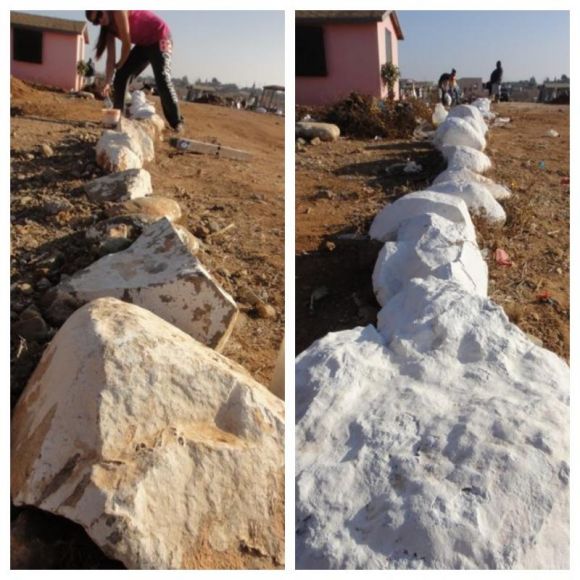
As part of our academy curriculum we are given the task to find a project. This project must be to help the community around us in some way. The guidelines weren’t very strict and we could do almost anything we thought would be a great for the community. My group, consisting of myself and Chey, chose to paint the rocks in the cemetery in an effort to make the dusty old place seem new again, and I think we did a great job!

If you go to your local cemetery at home you’re likely to see well maintained grass and many fancy head stones marking the spots where loved ones lay. In Mexico this is not the case. Not everyone can afford to pay for a head stone, or more commonly a miniature house to mark the grave of their loved ones, and as you walk through the rows of the cemetery you’ll quickly notice that some graves only have a large rock or two sticks tied together to mark a grave. Graves like this made me feel so sad, and were a sharp contrast to the full sized houses some people could afford that stood right next to them. It had never really occurred to me before how blessed I am to grow up in a place that has such fancy cemeteries, were everyone is taken care of equally and someone is paid to make sure all the graves look nice. Yes, not everyone’s stones are as fancy and maybe not everyone had a fancy funeral, but someone would never be placed in a cemetery like ours without something to mark their spot, something with their name and their birth date written so everyone who passed by would know who they were. Down here in Mexico however you see many crosses without a name and I can’t help but hurt inside for this person, who is now nameless to the world. I believe it’s the little things that make the biggest difference, and that is why we chose to do this as our Community Project.
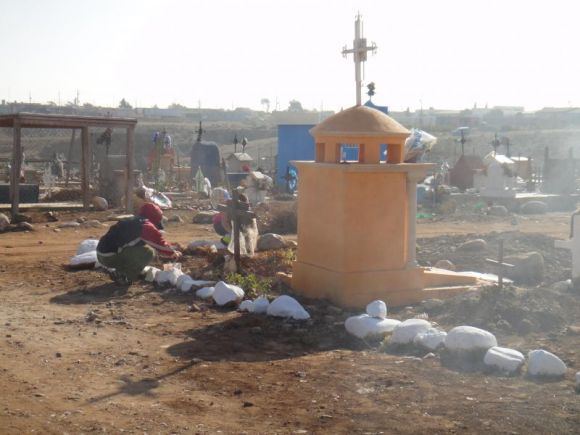
And as I sat painting the rocks it gave me a sense of joy to be able to give this family, who couldn’t afford anything to mark the grave, something beautiful, something that they would look at a think ‘someone must care’. I wish I could tell each of them that it’s true, that I do care, even if I didn’t actually know any of these people personally, most of which were children. I do care about the state in which they lay because I don’t think that the amount of money you make should determine how much beauty you’re allowed to surround yourself with. Everyone deserves to have nice things, even if all I can give them is a nicely painted rock. It’s the thought that counts, and I think most would appreciate being thought about on this beautiful Saturday afternoon.
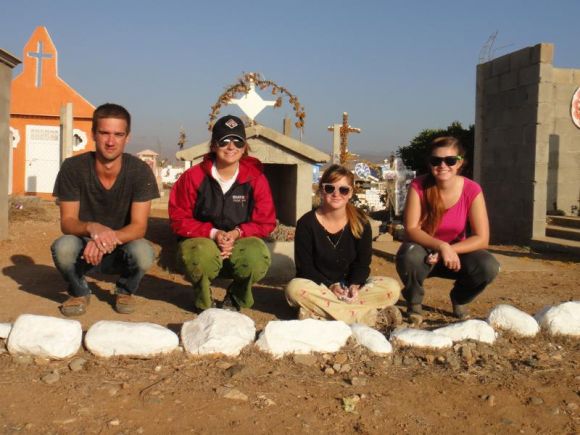
So the tans could wait, and we could nap another day because today we would rather lend a hand to someone less fortunate. Even if our backs hurt and we are now all covered in paint, I don’t think any one of us regrets the time we spent painting those rocks today. Even if losing someone close to you is the hardest thing anyone will have to go through I hope those people will smile when they see the work we did today by the grave of the person they love. I hope it makes them see the beauty in the world around them, and I hope they know that the person they loved so dearly changed my life, and made me thankful for the loved ones I still have, thankful for the life I live, and most of all thankful to have had the opportunity to help them in this small way. Though this project started out simply as an idea we had to help the community, it turned into something incredibly life-changing for me. I would have never guessed all this change would come from painting rocks but I couldn’t be happier it did!
Brigitte ~ LiveDifferent Academy Student 2012
As we marched from our food filled, warm bed holding, hot water pumping, electricity surging home to our new barren yard and wooden structure, I was thinking that Shack Week was going to be fun. I have been camping many times before: you set up your tent, stoke up a fire and await nature’s great amazements. This experience was more like surviving than camping, and by the end of it all, although I hate to admit it, I would come to miss those luxuries that our past dwelling possessed. Many Mexican families endure the long laborious days of the fields and come home to a great lack of those luxuries. Last week my fellow classmates and I were one of those families.
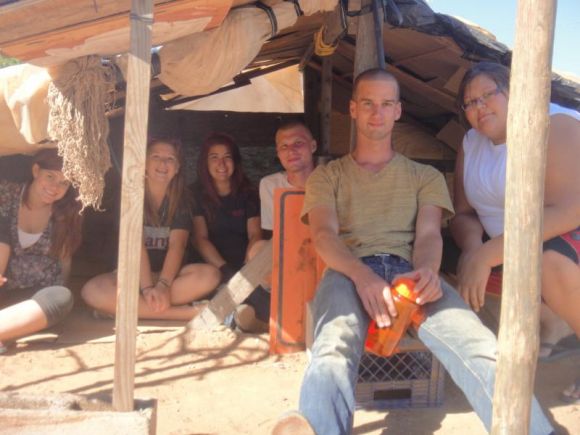
The physical and mental fatigue after the first few work days was coming down hard on all of us. This week was a lot harder than we first thought. I recall in the midst of vigorously ridding the tomato fields of weeds, speaking to a number of Mexican workers who toiled next to me. Although they slave day after day for minimal wages under the hot sun, they found rest and joy in sharing their stories and thoughts with us. I too found joy in enlightening them in response to their questions about why a bunch of ‘Gringos’ from up north would put themselves through an experience like Shack Week. As we were looking to go home at the end of a day, they were hoping to stay longer and earn a few more pesos. In the opinion of a labourer from North America, they do not earn a just amount for their labours. The field workers earn up to $14 US a day.
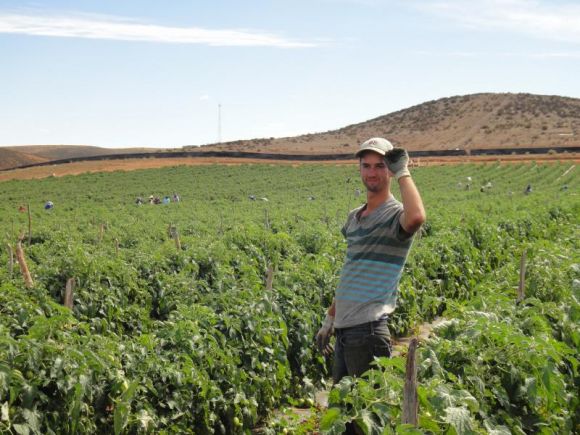
As the week progressed, the array of menial tasks and lack of nutrition drained me. Some jobs were harder on the back, and others harder on the brain, but throughout the week our team stayed strong and united, maintaining high spirits. At the end of the long days we would each take part in the necessary tasks that kept the shack running smoothly. We were very frugal with our spending for food and supplies and very thankful for the little food we did get. The week was a success because of the group’s bond and the rules we set to maintain peace. My biggest concern during Shack Week was the insufficient amount of food that I knew there was bound to be. Long work days are made more dreadful with a meager lunch. Most of the daily jobs like Rock Picking (rounding up a desired type of rock to sell for landscaping) and Clamming (collecting clams from the ocean floor) indicated that our daily pay would be dictated by the amount of product we brought in, which meant supper was directly affected by our collective work ethic. This taught me patience and acceptance in a big way. Any chance of sleeping soundly after work was removed by either a flash rain storm (enduring 5-10 minutes inflicted on us by our landlord) or the pounding of loud mariachi music played on our neighbours loudspeaker well into the night.
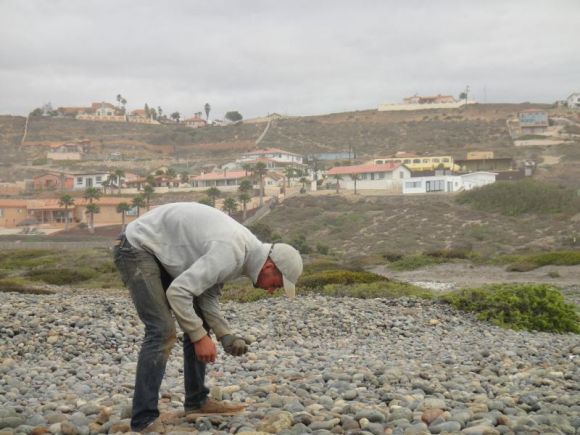
To sum it up, Shack Week is a magnified version of the daily struggle that surrounds us while living in Mexico. We get a more vivid glimpse into the world of the people among us who are just trying to make a living to support a family. In essence, the experience made me reflect on what it would be like to live like that for an entire lifetime. It has made me more thankful for the life I was given, and more passionate about using it to make struggles like this stop.
Kevin ~ LiveDifferent Academy student 2012
What we once saw as dirty garbage on the side of a Mexican highway we now see as a possible home. Dirty garbage bags and old mops, items we would have never dreamt to touch with our bare hands prior to last week, now held our roof in place. Cardboard boxes once filled with someone’s garbage, an item our mind previously didn’t even register sitting on the sides of the road, were now our floor; the only thing between us and the dirty ground beneath. It’s amazing how our instinct to survive will force you to do these things, use these items you would have never touched before. Shack week has opened our eyes to the world around us in a very new way. If you were to look at someone truly living in the circumstances simulated in shack week the first thing you would ask is ‘how do they live like that?’
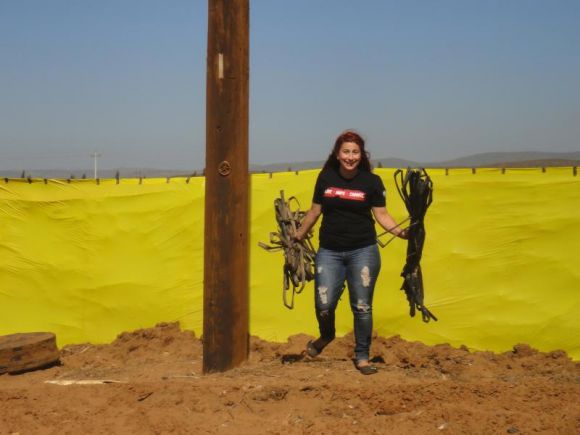
If you ask someone around this town, in Mexico, what the worst job is, most will tell you it’s working in the fields. After having worked in the fields myself I couldn’t agree more. The fields are both mind numbing and exhausting. You do the exact same motion for most of the day. Your back hurts, it’s hot, and it’s repetitive. By midday I just wanted to lie down in the middle of a row and sleep…but I would look up and see 100 people who do this every single day of their lives still working and would force myself to continue. I couldn’t comprehend how these people, some in their sixties, could work so hard while my 18 year old self struggled to even walk at the end of the second day. My experience in the fields made me so incredibly grateful that in Canada the worst job you could end up with is working at McDonalds.
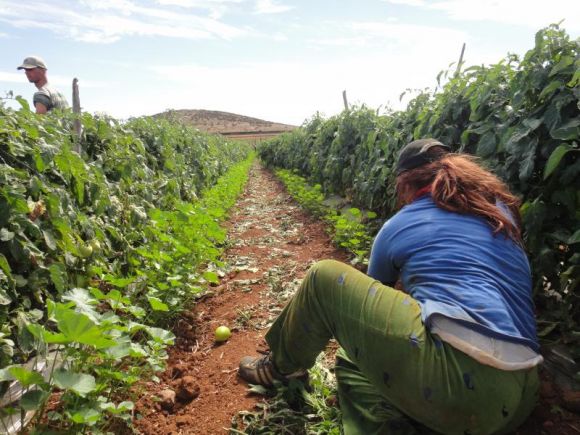
The one job we did that was actually rather fun was clamming. Besides the fact that it was cold, dark, and smelled like fish I enjoyed myself. The main reason being that the clammers were all so positive, and joked around constantly. They kept our spirits up even though we were completely horrible at clamming. It was wonderful to see a group of people doing this horrible job at all hours of the day and night, who chose to see the positive in everything and would rather have a laugh than be upset about their situation. It was a nice contrast to the previous day when we had no one to talk to and even though we made absolutely no profit for our work that night I think we all had fun and learned a lesson in the value of positivity.
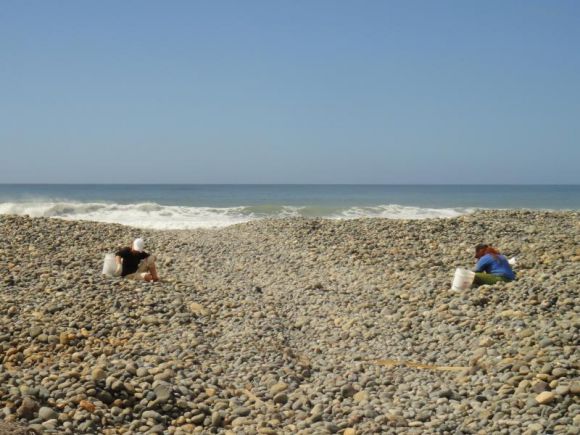
The other job we did was rock picking. Even though it was much less physically demanding than the fields, it was a million times more mind numbing. Spending 6-8 hours staring at rocks is definitely not my ideal day. I couldn’t imagine spending all my life alone staring at rocks. After some time, the rocks all looked the same and you struggled to even remember which ones you actually wanted. It was a very discouraging job, made even more discouraging by the view of the mansions on the hills. The idea that we had to go back to a shack while these people had houses big enough to hold 20 families made me sick. It was a very clear view of how our society works, poor people work hard in the heat for long hours while the rich sit up high and simply watch.
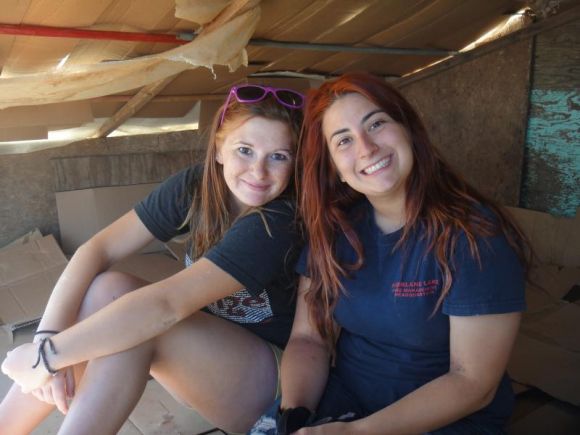
Shack week has made us all view the world around in a completely different manner. We once lived sheltered lives where poverty was only something you saw on TV, but now it’s something much more personal. We got a small glimpse of what it is like to not have enough food and not have a proper roof over our heads. We know what it feels like to work till you can no longer stand on your feet for a meager pay check, and now know the real value of food. We learned the value of staying positive and being a family even through times when we have nothing; it’s the most important thing we can do because our attitude towards a situation is the only thing we can control. We’ve also learned to watch what we throw away or call trash, because a pair of old shoes or a cardboard box that means nothing to us could mean the world to someone else. We’ve learned that one man’s trash is another man’s treasure.
Brigitte – LiveDifferent Academy Student 2012
The Academy students in Mexico go through a very challenging yet very rewarding week called ‘Shack Week.’ This is where they build themselves a ‘shack’ to live in, and work alongside the Mexicans in jobs such as field work, rock picking, and clamming. The students have just completed two days of hard work in the local tomato fields. Have a look at what they have to say about their experience.

Wow, so that’s what work is! Today was so tough, but I’m glad we all pulled through as a team. At times I just wanted to quit but then I reminded myself that some of these people come will back here everyday for most of their lives, so we can pull through two days. It is so different from the outside looking in thinking ‘that would suck,’ but then actually being there is such a crazy experience and you realize how fortunate you are. It makes me wonder what keeps them going. What do they look forward to? How do elderly people get through a day? I wish I could do more for the people here and I wish they didn’t have to live a life of struggle. I don’t understand why the world has to be like this, there are so many people who could help change things.
Chey

In the morning the mountains were back-lit by the sun, which made their silhouettes vibrant. It was a nice sight before a long day of work. As we bent and strained our backs to search almost aimlessly through the green tomato plants, I tried to imagine what it would be like to do this monotonous job day after day, week after week. Shuffling positions, trying to find one that didn’t hurt, but every movement led to another pain in my side or a cut on my knee. All day I tried to maintain my mantra that it will be lunch soon – imagine living your life like this!
Every time I close my eyes I see row upon row of tomato plants. Every time I look at my hands I am reminded of the weeds and dirt and leaves that blackened them. Today was a rough day. Even though there is a language barrier and my Spanish is not good, I talked with an older Spanish woman. She said she had been working in the fields a long time. There were about 20-30 other elderly folk in the same situation. They pretty much live to work. I can already tell that this experience will leave me thankful for a lot more than I have been before.
Kevin

The workers are always so full of joy and willing to help you in any way – including insisting I stay in the shade while waiting for the toilet in case my skin got burned! Even though the work was tough, seeing all the Mexicans working so diligently was encouragement enough to keep going. If we even thought about complaining about the pain, we just looked at the 70 year olds going at it with the hoe and we were proud of our youth. I will miss their warm smiles and care-free attitudes. Though it was the toughest work I have done in my life, I wouldn’t take back a single bit of it. It is an experience that has changed my life.
Jenna
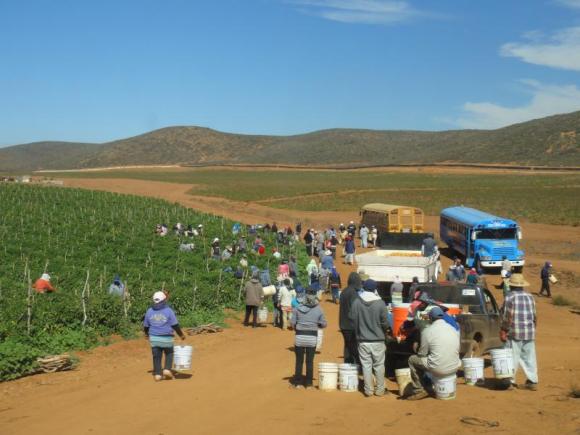
October 16th 2012, We left base camp at 0500 hours. We were tired yet excited for the task that lay before us. The walk to the pick up spot was rather nice. The morning air was crisp and the sun would be soon to rise over the hill. We were picked up by our captain and driven to our mission point. The work was hard. It is hard to comprehend how people get up that early every single day. I will never complain again. I can’t imagine how numb one must be, both physically and mentally. Around 1100 hours on our second day of field work I decided I never want to own a garden…ever! 9 hours of picking weeds is definitely enough for my lifetime.
When Canadians see Mexican fields on TV they would see what I saw at first, rows upon rows of crops each with a Mexican worker in them. It’s pretty beautiful especially with the view of the mountains in the background. However the thing you can’t get from your TV is how incredibly hot it is how long these people have been working, how physically demanding the tasks are, or even the ages of some of the workers.
Brigitte
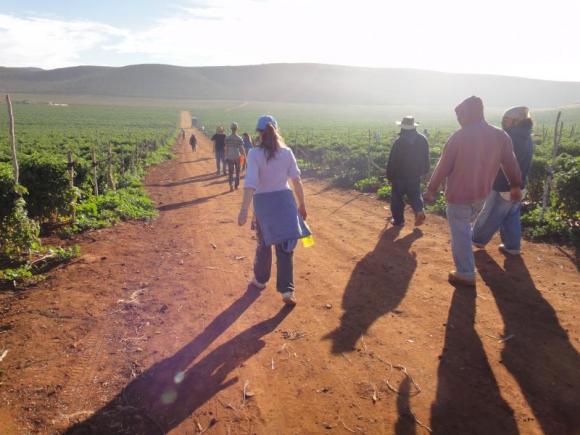
It’s my second of two days working in the fields. Today I needed to mentally and physically tell myself to keep going. I would look up and down the rows of tomato vines and think ‘wow these people do this six days a week!’ I thought back to my life in Canada and compared it to the life these people have here. It amazes me to think how different it is. Some people complain about working in a fast food restaurant at home yet here I met an old man called Coyote who laughed and made jokes all day through this hard work.
Gail
We met this beautiful woman on the Carson Graham Mexico trip this past spring. She showed up to help us clean the yard of her neighbour’s house as we were preparing to build them a new house! Such a selfless action, and we’ll never forget her!
